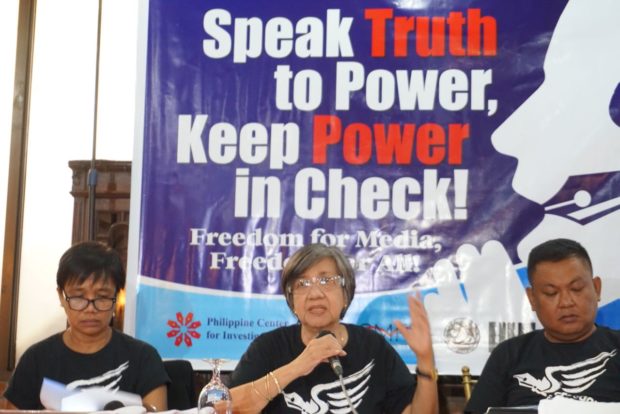85 cases of attacks vs media under Duterte admin – groups

Philippine Center for Investigative Journalism Executive Director Malou Mangahas (left), Center for Media Freedom and Responsibility Executive Director Melinda Quintos-de Jesus (center), and National Union of Journalists of the Philippines Director Raymund Villanueva (right) at the “Speak truth to power, Keep power in check” forum in Quezon City on Thursday, May 3, 2018, in observance of the World Press Freedom Day. (INQUIRER.net/Jhoanna Ballaran)
A total of 85 cases of attacks against the media have been recorded since July 2016 when President Rodrigo Duterte assumed office, “far exceeding” those recorded under four presidents before him, media groups said on Thursday.
In a joint report released in observance of the World Press Freedom Day, media institutions Center for Media Freedom and Responsibility (CMFR), National Union of Journalists of the Philippines (NUJP), Philippine Press Institute (PPI), and Philippine Center for Investigative Journalism (PCIJ) noted that the attacks “have made the practice of journalism an even more dangerous endeavor under President Duterte.”
According to the report, the 85 cases that allegedly occurred from June 30, 2016 to May 1, 2018, included the following: killing of nine journalists, filing of 16 libel complaints, 14 instances of online harassment, 11 death threats, six slay attempts, six occasions of harassment, five occurrences of intimidation, four incidents of website attack, revocation of registration or denial of franchise renewal, verbal abuse, strafing, and police surveillance of journalists as well as media agencies.
The report said the Duterte administration “has altered and controlled the public discourse so radically in its favor in ways rude and bold.”
“Its tragic result: it has restricted and narrowed the celebrated freedom of the Philippine press and the people’s cherished right to know,” the report noted.
Article continues after this advertisement“Duterte has unleashed much more violence against the autonomy of the press than has been seen since the overthrow of the Marcos regime in 1986.”
Article continues after this advertisement“Indeed, even without the legal instruments used during the period of Marcos-era martial law, the press has been placed effectively under government control,” it also said.
According to NUJP, members of the media who were slain under the Duterte administration were: Larry Que, Joaquin Briones, Christopher Lozada, Leo Diaz, Rudy Alicaway, Mario Cantaoi, Marlon Muyco, Apolinario Suan Jr., and most recently, Edmund Sestosa.
The group also cited “state-sponsored anti-media propaganda,” pointing out that Mr. Duterte “recklessly accused the media of inaccuracy and bias, of deliberately spreading ‘fake news’ supposedly to discredit his administration.”
But despite all these, the media groups believed the “attacks” only encouraged journalists to become more united in standing up for press freedom and the right to free expression.
“The Duterte government and his minions are trying to undermine and intimidate journalists and the practice of the freedom of the press and expression in this country.
[But] it only succeeded in uniting media organizations even tighter,” said NUJP director Raymund Villanueva during the forum in Quezon City.
PCIJ Executive Director Malou Mangahas, for her part, said the media should do its job and not be affected by Duterte “if he does not want talking.”
“We should ask better and hard questions. We have to move the conversation forward. Get facts, not insights and comments,” Mangahas added. /kga
RELATED STORY